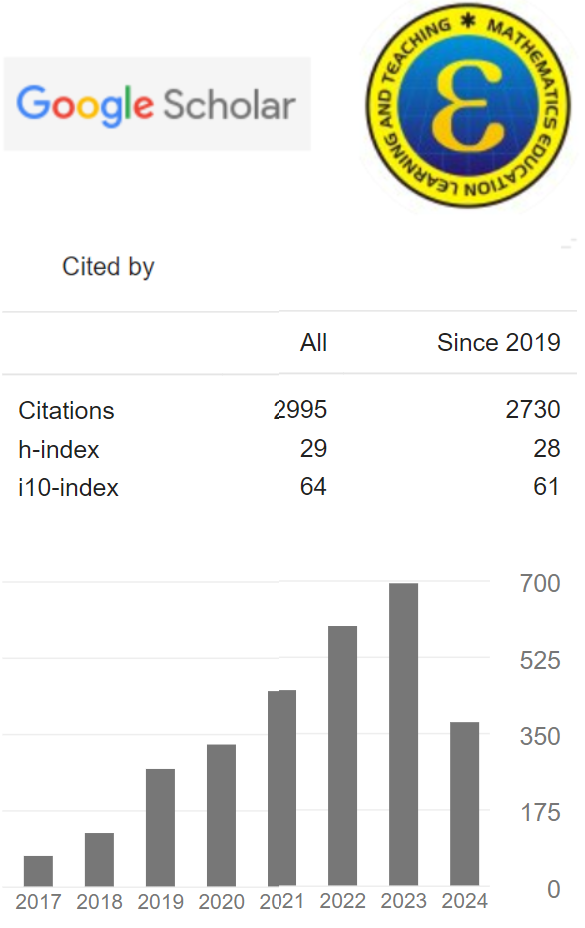Comparison of Problem Based Learning and Guided Discovery Learning in Terms of Students’ Mathematical Problem-Solving Ability
(1) Lecturer on Department of Mathematics Education, Universitas Bengkulu
(2) King Mongkut’s Institute of Technology Ladkrabang, Thailand
(*) Corresponding Author
Abstract
Indonesian students' problem solving abilities are currently still low. One of the reasons is because the learning model applied by the teacher is not student-centered. Several learning models that can be used include the Problem Based Learning (PBL) and Guided Discovery Learning (GDL) models. This study is quasi-experimental research. This study was conducted in the eight grade at SMPN 4 Bengkulu City for the 2021–2022 academic year. Two experimental groups were selected randomly from eight classes. After performing normality and homogeneity tests, a sample of class A was made up of 31 students who received Problem Based Learning (PBL) model treatment and class C was made up of 30 students who received Guided Discovery Learning (GDL) model treatment. In this study, two types of data analyses—descriptive data analysis and inferential analysis—were used. The data on the students’ problem-solving ability before and after treatment were described using descriptive analysis. The t-test of two independent sample means, which compares the means of two separate samples, was used to compare differences in the efficacy of learning models with PBL and GDL on students' ability to solve mathematical problems. The result shows that the ability to solve mathematical problems on average using the PBL model and the GDL approach is equivalent
Keywords
Full Text:
PDFReferences
Abdisa, G., & Getiner, T. (2012). The effect of guided discovery on students ’ physics achievement. Latin-American Journal of Physics Education, 6(4), 530–537. http://www.lajpe.org/dec2012/4_LAJPE_715_Tesfaye_Getinet_preprint_corr_f.pdf
Achsin, M. A., Kartono, K., & Wibawanto, H. (2020). Analysis of Problem Solving Capabilities in Problem Based Learning Contextual Approaches Based on Metacognitive Awareness. Unnes Journal of Mathematics Education Research, 9(2), 147-155. https://journal.unnes.ac.id/sju/ujmer/article/view/32979
Akinoǧlu, O., & Tandoǧan, R. Ö. (2007). The effects of problem-based active learning in science education on students’ academic achievement, attitude and concept learning. Eurasia Journal of Mathematics, Science and Technology Education, 3(1), 71–81. https://doi.org/10.12973/ejmste/75375
Andesma, T., & Anggraini, R. D. (2019). Penerapan pbl untuk meningkatkan kemampuan pemecahan masalah matematis siswa kelas X TKR 1 SMK Muhammadiyah 1 Pekanbaru. Jurnal Prinsip Pendidikan Matematika, 2(1), 12–18. https://doi.org/10.33578/prinsip.v2i1.35
Asmara, A., & Zachriwan, Z. (2021). Kemampuan literasi matematis mahasiswa melalui model problembased learning menggunakan klinometer. 3(1), 77–84. https://doi.org/http://dx.doi.org/10.29240/ja.v3i1.3100
Astuti, N. T., Prasiwi, A., & Yusuf, M. I. (2018). Mengembangkan Kemampuan Berpikir Kreatif Dengan Pembelajaran Guided Discovery. In Prosiding Seminar Nasional Universitas Pekalongan (Vol. 84). https://proceeding.unikal.ac.id/index.php/job/article/view/177
Carson, J. (2007). A problem with problem solving: Teaching thinking without teaching knowledge. The mathematics educator, 17(2), 7-14. https://ojs01.galib.uga.edu/tme/article/view/1912
Eggen, P., & Kauchak, D. (2012). Strategi dan model pembelajaran: mengajarkan konten dan keterampilan berpikir (6th ed.). Permata Puri Media.
Fani, M. S., & Indarini, E. (2023). Penerapan Model Problem Based Learning (PBL) untuk Meningkatkan Kemampuan Berpikir Kritis dan Hasil Belajar Matematika SD. JIIP -Jurnal Ilmiah Ilmu Pendidikan, 6(12), 10132–10138. https://doi.org/10.54371/jiip.v6i12.2413
Graciella, M., & Suwangsih, E. (2016). Penerapan Pendekatan Matematika Realistik Untuk Meningkatkan Kemampuan Representasi Matematis Siswa. Metodik Didaktik, 10(2), 27–36. https://doi.org/10.17509/md.v10i2.3180
Maulyda, M. A. (2020). Paradigma pembelajaran matematika berbasis NCTM. Malang: CV Irdh.
Mullis, I. V. S., Martin, M. O., Foy, P., & Hooper, M. (2016). TIMSS 2015 international results in mathematics. Boston College, TIMSS & PIRLS International Study Center. http://timssandpirls.bc.edu/timss2015/international-results/
Nahdi, D. S. (2018). Eksperimentasi model problem based learning dan model guided discovery learning terhadap kemampuan pemecahan masalah matematis ditinjau dari self efficacy siswa. Jurnal Cakrawala Pendas, 4(1), 50–56. https://doi.org/10.1136/emj.2003.012435
Nugraha, M. R., & Basuki, B. (2021). Kesulitan kemampuan pemecahan masalah matematis siswa SMP di desa Mulyasari pada materi statistika. Plusminus: Jurnal Pendidikan Matematika, 1(2), 235–248. https://doi.org/10.31980/plusminus.v1i2.1259
OECD. (2013). PISA 2012 assessment and analytical framework: mathematics, reading, science, problem solving and financial literacy. In OECD. https://doi.org/10.4324/9781003090366
Onikarini, N. L. Y., Suardana, I. N., & Selamet, K. (2019). Komparasi model pembelajaran guided dan free discovery terhadap hasil belajar siswa dalam pembelajaran IPA. Jurnal Pendidikan Dan Pembelajaran Sains Indonesia (JPPSI), 2(2), 80–91. https://doi.org/10.23887/jppsi.v2i2.19376
Pratiwi, A. N., Azizah, M., & Kartinah, K. (2023). Efektifitas model guided discovery learning terhadap kemampuan pemecahan masalah materi bangun ruang kelas V. Jurnal Kualita Pendidikan, 4(1), 60–65. https://doi.org/10.51651/jkp.v4i1.345
Pratiwi, R., & Musdi, E. (2021). Meningkatkan kemampuan pemecahan masalah matematis peserta didik melalui model pembelajaran problem based learning. Jurnal Edukasi Dan Penelitian Matematika, 10(1), 85–91. http://dx.doi.org/10.24036/pmat.v10i1.11481
Stiadi, E., Putra, A., & Lestary, R. (2022). Analisis kemampuan siswa dalam menguasai komponen content ketika menyelesaikan soal literasi matematika PISA di SMPN 4 Kota Bengkulu. Jurnal Penelitian Pembelajaran Matematika Sekolah (JP2MS), 6(3), 440–449. https://doi.org/10.33369/jp2ms.6.3.440-449
Susanto, E., Susanta, A., Maizora, S., & Rusdi, R. (2021). Analisis kemampuan siswa smp/mts kota bengkulu dalam menyelesaikan soal matematika TIMSS. Jurnal THEOREMS (The Original Research of Mathematics), 5(2), 131. https://doi.org/10.31949/th.v5i2.2567
Tan, O. S. (2004). Cognition, metacognition, and problem-based learning, in enhancing thinking through problem-based learning approaches. Singapore: Thomson Learning.
Tarsiyah, T. (2021). Penerapan Model Guided Discovery Learning Untuk Mempertahankan Hasil Belajar Matematika Siswa Kelas Vii Smp Negeri 1 Pandaan Selama Pandemi Covid-19 Tahun Ajaran 2020 / 2021. LIKHITAPRAJNA Jurnal Ilmiah, 23(1), 26–39. https://doi.org/10.37303/likhitaprajna.v23i1.188
Wibowo, T. (2019). Metode diskoveri terbimbing (guided discovery): Konsep dan aplikasi dalam pembelajaran sains MI/SD. Elementary: Islamic Teacher Journal, 7(1), 55–74. https://doi.org/10.21043/elementary.v7i1.4776
DOI: 10.24235/eduma.v13i1.13723
Article Metrics
Abstract view : 43 timesPDF - 7 times
Refbacks
- There are currently no refbacks.
Copyright (c) 2024 EduMa: Mathematics education learning and teachingâ€â€â€Ž


.png)










